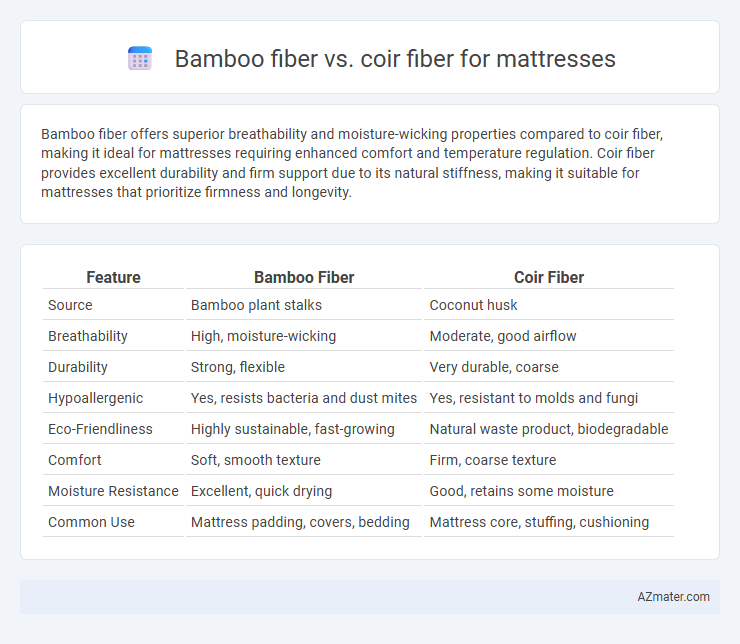Bamboo fiber offers superior breathability and moisture-wicking properties compared to coir fiber, making it ideal for mattresses requiring enhanced comfort and temperature regulation. Coir fiber provides excellent durability and firm support due to its natural stiffness, making it suitable for mattresses that prioritize firmness and longevity.
Table of Comparison
| Feature | Bamboo Fiber | Coir Fiber |
|---|---|---|
| Source | Bamboo plant stalks | Coconut husk |
| Breathability | High, moisture-wicking | Moderate, good airflow |
| Durability | Strong, flexible | Very durable, coarse |
| Hypoallergenic | Yes, resists bacteria and dust mites | Yes, resistant to molds and fungi |
| Eco-Friendliness | Highly sustainable, fast-growing | Natural waste product, biodegradable |
| Comfort | Soft, smooth texture | Firm, coarse texture |
| Moisture Resistance | Excellent, quick drying | Good, retains some moisture |
| Common Use | Mattress padding, covers, bedding | Mattress core, stuffing, cushioning |
Introduction to Natural Fiber Mattresses
Natural fiber mattresses, such as those made from bamboo fiber and coir fiber, offer eco-friendly, breathable, and hypoallergenic sleeping surfaces. Bamboo fiber provides exceptional moisture-wicking and antibacterial properties, making it ideal for sensitive skin and humid environments. Coir fiber, derived from coconut husks, delivers firm support and excellent durability, promoting proper spinal alignment and ventilation within the mattress core.
What is Bamboo Fiber?
Bamboo fiber is a natural textile material derived from the pulp of bamboo grass, known for its softness, breathability, and antimicrobial properties, making it ideal for mattress covers and padding. Unlike coir fiber, which is extracted from coconut husks and valued for firmness and durability, bamboo fiber provides a smoother, hypoallergenic surface that enhances comfort and moisture-wicking. Its eco-friendly production process and biodegradability contribute to sustainable mattress manufacturing.
Overview of Coir Fiber
Coir fiber, derived from the husk of coconut shells, is a natural, coarse fiber commonly used in mattresses for its durability and breathability. Its high resilience and moisture-wicking properties make coir an excellent choice for providing firm support and maintaining a dry sleeping environment. Compared to bamboo fiber, coir offers superior firmness and longevity, making it ideal for orthopedic and eco-friendly mattress designs.
Bamboo Fiber Mattress: Key Benefits
Bamboo fiber mattresses offer exceptional breathability and moisture-wicking properties, promoting a cooler and more comfortable sleep environment compared to coir fiber mattresses. The natural antibacterial and hypoallergenic qualities of bamboo fiber reduce allergens and dust mites, enhancing overall bedroom hygiene. Bamboo fiber's softness combined with durability provides superior comfort and longevity, making it an ideal material for high-quality mattresses.
Coir Fiber Mattress: Key Advantages
Coir fiber mattresses offer exceptional durability and natural resistance to dust mites and mold, making them ideal for allergy sufferers. These mattresses provide firm support and excellent ventilation due to the porous structure of coir, enhancing comfort and hygiene. Compared to bamboo fiber mattresses, coir mattresses maintain their shape longer and are highly eco-friendly, sourced from renewable coconut husks.
Comfort and Support Comparison
Bamboo fiber mattresses offer superior breathability and moisture-wicking properties, providing enhanced comfort through temperature regulation and softness. Coir fiber mattresses excel in support with their natural firmness and durability, promoting spinal alignment and reducing pressure points. Combining bamboo's cushioning qualities with coir's structural support often results in an optimal balance of comfort and resilience for mattress users.
Durability and Longevity
Bamboo fiber mattresses offer superior durability due to their natural resistance to wear, moisture, and microbial growth, enhancing mattress longevity in humid conditions. Coir fiber, derived from coconut husks, provides excellent firmness but tends to degrade faster when exposed to prolonged moisture and pressure, reducing its lifespan compared to bamboo fiber. Choosing bamboo fiber results in a longer-lasting, more resilient mattress, especially for users seeking sustainable and low-maintenance bedding options.
Environmental Impact and Sustainability
Bamboo fiber for mattresses offers superior sustainability due to its rapid growth rate and minimal water requirement, making it an eco-friendly choice that reduces deforestation. Coir fiber, derived from coconut husks, is biodegradable and naturally resistant to mold and pests but involves more intensive processing and energy consumption compared to bamboo. Both fibers contribute to reducing synthetic material use, yet bamboo's renewable cultivation practices provide a lower environmental footprint in mattress production.
Cost and Accessibility
Bamboo fiber mattresses generally have a higher upfront cost due to their sustainable production processes and advanced textile technology, but they offer widespread accessibility through online retailers and eco-friendly stores. Coir fiber mattresses are more budget-friendly, leveraging the abundant availability of coconut husk materials, and are widely accessible in tropical regions where coir production is prevalent. Cost-effectiveness and regional availability make coir an economical choice, while bamboo fiber appeals to consumers prioritizing eco-conscious options despite the premium price.
Which Fiber is Best for You?
Bamboo fiber offers excellent moisture-wicking properties, natural antibacterial benefits, and a soft, breathable texture ideal for hot sleepers or those with sensitive skin. Coir fiber, derived from coconut husks, provides firm support, durability, and superior breathability, making it suitable for individuals seeking a firmer mattress and enhanced airflow. Choosing between bamboo and coir fibers depends on your preference for softness and moisture control versus firmness and long-lasting structural support.

Infographic: Bamboo fiber vs Coir fiber for Mattress
 azmater.com
azmater.com